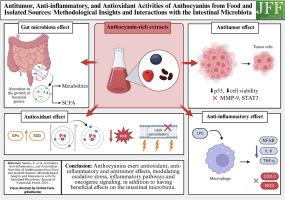Antitumor, anti-inflammatory, and antioxidant activities of anthocyanins from food and isolated sources: Methodological insights and interactions with the intestinal microbiota
IF 4
2区 农林科学
Q2 FOOD SCIENCE & TECHNOLOGY
引用次数: 0
Abstract
Anthocyanins are secondary metabolites found in plants, commonly present in fruits such as strawberries, grapes, and blueberries. They act as antioxidants, protecting plant cells from oxidative damage, and are known for their potential role in chronic disease prevention. In studies, anthocyanins have been investigated both in food matrices and in isolated forms. They neutralize free radicals, which can damage cells, and reduce inflammation by downregulating pro-inflammatory cytokines involved in chronic diseases. Additionally, they have shown potential in modulating tumor cell proliferation, making them valuable for human health. This review explores the antioxidant, anti-inflammatory, and antitumor activities of anthocyanins, highlighting the methods used to assess these properties. Moreover, it discusses their interaction with the gut microbiota, which enhances anthocyanin biological effect through the production of short-chain fatty acids and phenolic metabolites derived from microbial metabolism. The review also addresses the challenges and future perspectives for the industrial-scale application of anthocyanins.

来自食物和分离来源的花青素的抗肿瘤、抗炎和抗氧化活性:方法见解和与肠道微生物群的相互作用
花青素是植物中发现的次生代谢物,通常存在于草莓、葡萄和蓝莓等水果中。它们作为抗氧化剂,保护植物细胞免受氧化损伤,并以其在慢性疾病预防中的潜在作用而闻名。在研究中,花青素已经在食物基质和分离形式中进行了研究。它们中和自由基,自由基可以破坏细胞,并通过下调与慢性疾病有关的促炎细胞因子来减少炎症。此外,它们已显示出调节肿瘤细胞增殖的潜力,使它们对人类健康有价值。本文综述了花青素的抗氧化、抗炎和抗肿瘤活性,重点介绍了评估这些特性的方法。此外,还讨论了它们与肠道菌群的相互作用,通过产生微生物代谢产生的短链脂肪酸和酚类代谢物来增强花青素的生物学效应。综述还提出了花青素工业规模应用的挑战和未来展望。
本文章由计算机程序翻译,如有差异,请以英文原文为准。
求助全文
约1分钟内获得全文
求助全文
来源期刊

Journal of Functional Foods
FOOD SCIENCE & TECHNOLOGY-
CiteScore
9.60
自引率
1.80%
发文量
428
审稿时长
76 days
期刊介绍:
Journal of Functional Foods continues with the same aims and scope, editorial team, submission system and rigorous peer review. We give authors the possibility to publish their top-quality papers in a well-established leading journal in the food and nutrition fields. The Journal will keep its rigorous criteria to screen high impact research addressing relevant scientific topics and performed by sound methodologies.
The Journal of Functional Foods aims to bring together the results of fundamental and applied research into healthy foods and biologically active food ingredients.
The Journal is centered in the specific area at the boundaries among food technology, nutrition and health welcoming papers having a good interdisciplinary approach. The Journal will cover the fields of plant bioactives; dietary fibre, probiotics; functional lipids; bioactive peptides; vitamins, minerals and botanicals and other dietary supplements. Nutritional and technological aspects related to the development of functional foods and beverages are of core interest to the journal. Experimental works dealing with food digestion, bioavailability of food bioactives and on the mechanisms by which foods and their components are able to modulate physiological parameters connected with disease prevention are of particular interest as well as those dealing with personalized nutrition and nutritional needs in pathological subjects.
 求助内容:
求助内容: 应助结果提醒方式:
应助结果提醒方式:


